### Key Insights from the Landmark Review of England and Wales’ Water Sector
The long-anticipated review of England and Wales’s troubled water sector has finally been published. Authored by the independent Water Commission and led by Sir Jon Cunliffe, a former deputy governor of the Bank of England, this document spans a substantial 465 pages. It is filled with critical findings and actionable recommendations aimed at reforming a sector that has long faced public scrutiny over sewage spills and increasing bills. Here’s a detailed look into the five key takeaways from this comprehensive assessment.
#### 1. Accountability Across the Board – The End of Ofwat
The review directly implicates various stakeholders in the current state of the water sector, asserting that no one party can be exonerated—be it the government, water companies, or regulatory bodies. Sir Jon Cunliffe stressed during a BBC Breakfast interview that “the underlying fact is we have not managed this well.” The review particularly criticizes the role of regulators in maintaining water quality and service efficiency. Currently, oversight responsibilities are spread across multiple entities, including Ofwat, the Environment Agency, Natural Resources Wales, and the Drinking Water Inspectorate.
One of the most significant recommendations suggests abolishing Ofwat to create a unified regulatory framework that combines economic and environmental oversight into a single regulatory body. The government has already signaled its intent to implement this reform, indicating a substantial shift in how the water industry will be regulated moving forward.
#### 2. Moving Away from Self-Monitoring Practices
The report highlights that the surge in awareness surrounding sewage spills is attributed to enhanced monitoring capabilities. The Water Commission calls for an urgent overhaul of the “operator self-monitoring” processes that currently allow water companies to self-report incidents of pollution. Many campaigners have flagged this as a major conflict of interest, akin to ‘marking their own homework.’
While the review stops short of recommending that all monitoring be transferred to independent regulators due to potential cost concerns, it advocates for improved scrutiny measures, including increased automation, third-party verification, and intelligence-led inspections. Sir Jon Cunliffe also proposes leveraging advanced technologies, such as artificial intelligence, to better assess the environmental impact of sewage spills.
#### 3. Strengthening Oversight of Ownership Without Nationalization
Another pivotal recommendation emphasizes enhancing regulatory control over who owns water companies. It requests the establishment of a new framework for executive accountability within these entities while suggesting additional measures to attract long-term investment and improve fiscal oversight.
However, critics argue that the review’s exclusion of nationalization as a viable option reflects a fundamental oversight. Campaign groups like Surfers Against Sewage have denounced the review for prioritizing financial interests over public benefit. Sir Jon maintains that effective regulation can improve the existing privatized model. He draws upon historical context, lamenting the period before privatization when the UK was labeled the “dirty man of Europe.”
#### 4. Expected Increase in Water Bills
The Commission’s findings indicate that external pressures—such as climate change and a growing population—compounded by years of suppressed investment due to government and regulatory preferences for low bills, have led to an inevitable rise in water costs. The regulators approved a staggering 26% hike in average bills for the 2024/25 to 2025/26 period, a consequence of delayed investments coming back to haunt consumers.
Sir Jon articulated the need for caution, recommending the introduction of a “national social tariff” to offset costs for those on lower incomes and suggesting the use of smart meters for efficient water consumption. This approach seeks to balance financial viability with social responsibility.
#### 5. The Complexity of Reform: No Quick Solutions
Despite the hopeful tone conveyed by Environment Secretary Steve Reed regarding clean water initiatives, the review emphasizes that significant improvements will not materialize overnight. As Sir Jon notes, no quick fixes exist for this complex issue. He underscores that transformative change necessitates time, indicating that infrastructure development can be a lengthy process.
The government has already committed to scrapping Ofwat and is set to accept four initial recommendations from the review. Nonetheless, many of the remaining 83 suggestions require deliberation, and their implementation will depend on future legislative actions.
In conclusion, while the landmark review sets a critical foundation for reforming the water sector, actual change will hinge on political will and the collective commitment of all stakeholders involved. The multifaceted challenges ahead demand comprehensive strategies and vigilant oversight to ensure a sustainable water future for England and Wales.











